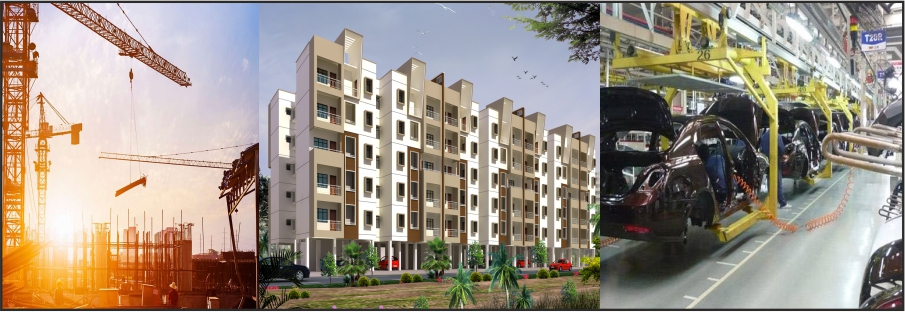Govt announces slew of measures to revive economic growth

In a move to revive the economic slowdown, Union Finance Minister Nirmala Sitharaman announced a slew of measures on 23 August 2019. From simplification and reform in taxation, increasing capital flows, energising financial markets to measures to boost infrastructure, automotive sector, etc.
A major announcement was made to boost infrastructure. The government plans to infuse Rs 100 lakh crore towards developing modern infrastructure over the next five years. The Department of Economic Affairs will set up an inter-ministerial task force to shortlist infrastructure projects for its ambitious target. The move will bolster economic growth and also create job opportunities.
Delay in payments from government/CPSEs will be monitored by the Department of Expenditure and the performance will be reviewed by Cabinet Secretariat. Apart from this, 75 percent of the payments under arbitration will be released immediately, while the remaining 25 percent will be paid pending final order.
Witnessing the current slowdown in the automotive sector, a slew of announcements were made in this sector. In a move to boost demand, the government lifted ban on purchase of new vehicles for replacing old vehicles. Also, the government will consider various measures including scrappage policy and one-time registration fees has been deferred till June 2020.
The depreciation announced on all vehicles has been increased to 30 percent for purchases during the period from now till 31 March 2020. The government will focus on setting up infrastructure for development of ancillaries/components including batteries for export.
Measures were also announced for Banks/NBFCs/MSMEs with upfront release of Rs 70,000 crore, additional lending and liquidity to the tune of around Rs five lakh crore by providing upfront Capital to PSBs. The banks will pass on the marginal cost of funds-based lending rate (MCLR) reduction to all borrowers. This move will benefit corporates, retail borrowers, MSMEs, small traders, etc.
In a relief to home buyers and vehicle buyers it has been decided that banks will launch repo/external benchmark linked to loan products. The main aim is to reduce the interest rate on housing and auto rates. Also, online tracking of loan applications by customers of retail, MSME, housing, vehicle, working capital, renewals, etc will be made which will increase transparency and improve turn around time for customers.
To provide more credit support to housing finance companies, additional liquidity support will be provided to HFCs worth Rs 20,000 crore by NHB, thus increasing the total support to Rs 30,000 crore. Further, PSBs will fast track collaboration for loans to MSMEs, small traders, self-help groups, MFI clients borrowers in co-origination mode with NBFCs. Moreover, all pending GST refund due to MSMEs will be paid within 30 days and in future all GST refunds will be made within 60 days from the date of application.
Following this, the Reserve Bank of India (RBI) also made a major announcement. The central bank approved transfer of Rs 1.76 lakh crore dividend and surplus reserves to the government of India, boosting the government’s prospect to stimulate the slowing economy without widening fiscal deficit.
The RBI central board gave nod for transferring Rs 1,76,051 crore comprising Rs 1,23,414 crore of surplus for the year 2018-19 and Rs 52,637 crore of excess provisions identified as per the revised Economic Capital Framework (ECF).
The transfer of excess reserve is in line with recommendation from former RBI Governor Bimal Jalan-led panel constituted to decide the size of capital reserves that RBI should hold. The Central bank in its November 2018 board meeting decided to form a committee to review the economic capital framework (ECF) for RBI. The panel was constituted in consultation with RBI Governor Shaktikanta Das on 26 December 2018.
As financial resilience was within the desired range, the entire net income of Rs 1,23,414 crore for FY19, of which an amount of Rs 28,000 crore has already been paid as interim dividend, will be transferred to the government in March 2019. The government will get a higher dividend of Rs 95,414 crore during FY20 as against the estimate of Rs 90,000 crore.
The Union Budget 2019-20 had pegged dividend or surplus of RBI, nationalised banks and financial institutions at Rs 1.06 lakh crore up from Rs 74,140.37 crore realised in 2018-19. An amount of Rs 40,659 crore was transferred in dividend to the government in FY18.
The committee also recommended maintaining the Contingent Risk Buffer (CRB) within a range of 6.5 percent to 5.5 percent of RBI’s balance sheet, comprising 5.5 percent to 4.5 percent for monetary and financial stability risks and one percent for credit and operational risks.
The board also decided to maintain the realised equity level at 5.5 percent of balance sheet, and the resultant excess risk provisions of Rs 52,637 crore were written back.